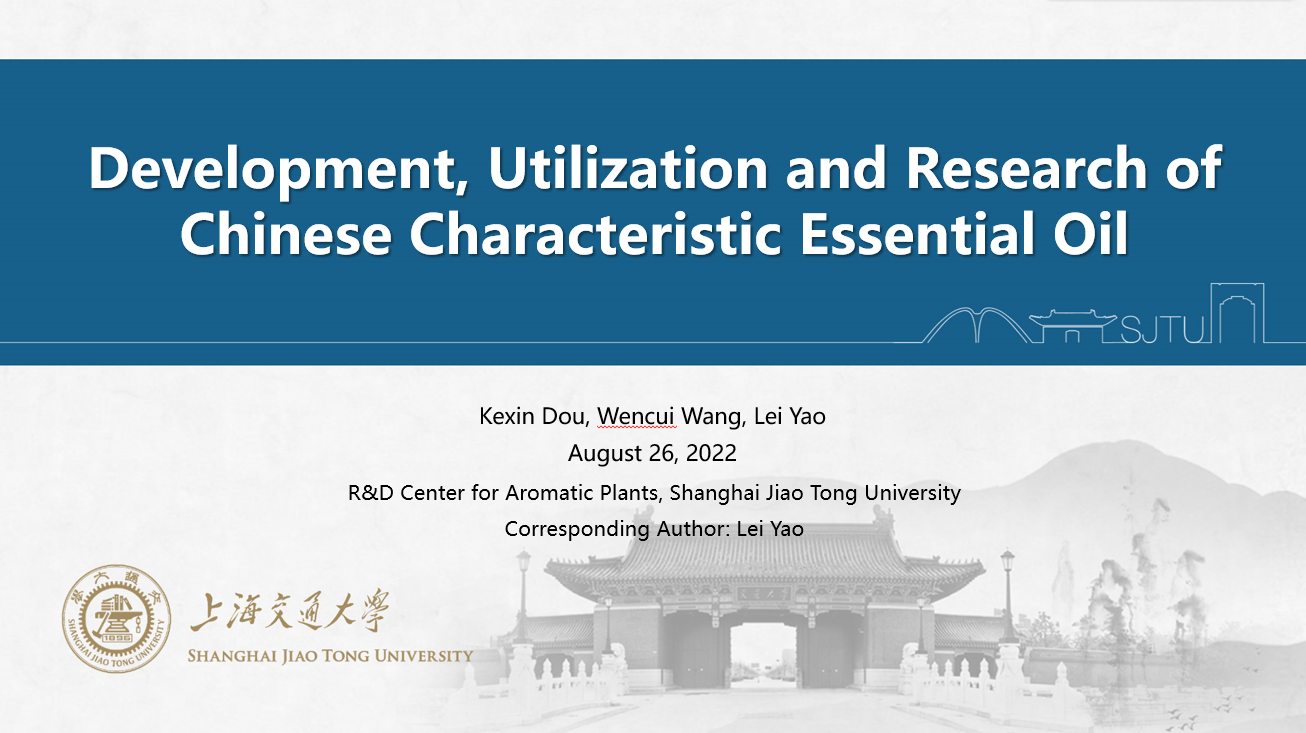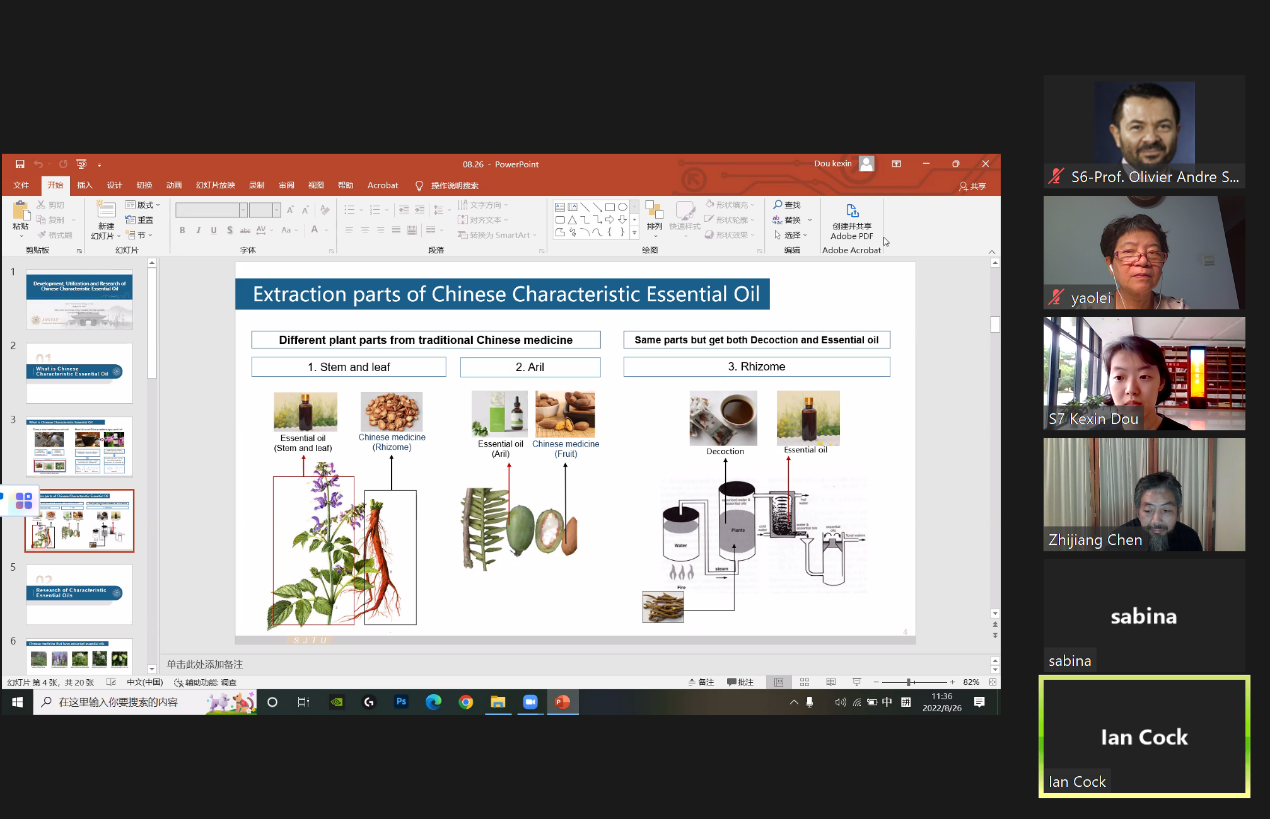
On the morning of August 26, 2022, the International Online Conference on Traditional and Alternative Medicine was successfully held in Singapore. The conference was initiated by the Scientific Wisdom organization headquartered in the Netherlands.
Scientific Wisdom is committed to promoting the new development of traditional and alternative medicine in today's medical field, advocating the discovery and clinical application of natural products. The Research & Development Center for Aromatic Plants of Shanghai Jiao Tong University (hereinafter referred to as the Aroma Center) was invited to attend the meeting, and Dou Kexin, a graduate student supervised by Professor Yao Lei delivered an academic report. Scholars and experts in related fields from Canada, the United States, Australia, Japan, Italy, Singapore and other countries participated.

Dou Kexin's report topic
The topic of the report is: “Development, Utilization and Research of Chinese Characteristic Essential Oil”. It mainly introduces the essential oils extracted from 12 kinds of Chinese herbal medicines by the Aroma Center in recent years, analyzes the components and reveals the possible effects of the essential oils.
Essential oils extracted from Chinese herbal medicines, we call them "Chinese element essential oils". For a long time, the main parts of traditional Chinese medicine plants used are rhizomes, the method of use is decoction, and the active ingredients are macromolecular substances such as flavonoids and tannins. Under the traditional use of Chinese herbal medicine, the small molecular components in essential oils are often left to volatilize and not collected, the nontraditional above-ground plant parts are often wasted. This study focuses on specific parts of these Chinese herbal medicines, such as nontraditional utilization of plant part: Salvia miltiorrhiza (stem and leaf), Scutellaria baicalensis (stem and leaf), Saposhnikovia divaricata (stem and leaf), Angelica pubescens (stem and leaf), Torreya grandis (aril), Zingiber officinale (leaf); and traditional utilization plant part: Curcuma kwangsiensis (rhizome), Curcuma longa (rhizome), Atractylodes macrocephala (rhizome), Ligusticum chuanxiong (rhizome), Bupleurum chinense (rhizome), Artemisia sieversiana (stem and leaf), to extract essential oil and analyze composition. The study found that this method of extraction is conducive to the comprehensive utilization of Chinese medicine plants, and improves the therapeutic value and resource utilization of Chinese medicine plants. Our research will further explore the resources and functions of Chinese characteristic essential oils, explore more effects and add value of Chinese medicine plants, and this is also an innovation in the comprehensive development and utilization of Chinese medicine plant resources.

Introduction of the parts where Chinese medicine essential oil exist

Introduction of collecting both decoction and essential oil of Chinese medicine

Answers to questions from Professor Ian Cock (Griffith University, Australia)
After the academic report, a lot of experts asked questions. For example, Professor Olivier AE Sparagano (City University of Hong Kong) mentioned that essential oils can be used as toxins and repellents to fight ectoparasites such as ticks and mosquitoes. He hopes to carry out scientific research cooperation and jointly carry out some research on the safety of essential oils; Professor Ian Edwin Cock (Griffith University, Australia) affirmed that we have done a lot of useful research, and also suggested that on the basis of traditional extraction methods of traditional Chinese medicine, we should pay more attention to the extraction process of comprehensive utilization of waste; Dr. Zhijiang Chen from the United States believes that essential oils are more effective and faster to use than other alternative medicines. He also reminded us how to recycle the residual soup or waste after the extraction of essential oils. Experts at the meeting put forward a lot of ideas and opinions that can be used for reference.

After the speeches, the experts asked questions
Professor Yao Lei attended the conference together, and felt that participating in the international academic conference is not only an exercise for our students, but also an academic growth. International conferences not only allow our students to stand on the international stage and listen to the opinions and voices of experts from all over the world, but also expand their academic innovation horizons and cultivate their academic abilities. We will create more opportunities for students to stand on the stage of international academic conferences and express their academic views, promote the development of the aromatic industry and cooperate with more well-known foreign universities and scientific research institutions, so that Chinese aromatic plants will be on the main track of the international scientific frontier.